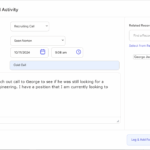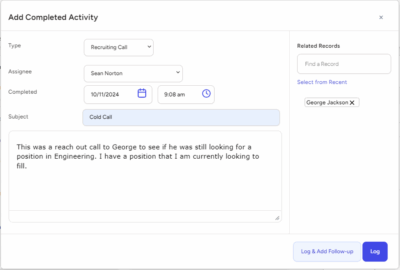In a previous blog post for the Top Echelon Recruiter Training Blog, I discussed “Getting Your Recruiting Team to ‘Own’ Its Performance.”
Then I addressed the “Key Ingredient to Recruiting Success.”
This blog post is the third and final in this series. With it, I’ll be discussing the importance of setting personal goals and team goals in recruiting.
Often, individuals and teams struggle to get behind a winning game plan because they don’t feel it is theirs. It is a random number that management assigns and says “play ball!” People do not go to work to achieve the goals of the organization or to create wealth for the owner, they go to work to achieve their own personal goals.
If an employee sees value from the organization in helping them to achieve their goals, they typically stay and perform. When they stop seeing value, they leave. The more an employer can help the employee to achieve their personal objectives, no matter what they are, the more value they bring to the employee.
Personal goals in recruiting
It is so important to completely understand an employee’s personal goals. This could include career goals, financial goals, “thing” goals, and other personal objectives. The more that you know, the more you can help them achieve their life dreams.
By helping them to achieve their dreams, you will get more performance and ownership from each of them. Using an annual Personal Scorecard for each employee will give you the opportunity to get to know what is important to them. Have them share it with you and discuss what it will take based on their batting average to make it hap- pen. Business goals can then be correlated to personal goals and when they are connected . . . it’s a home run!
Team goals in recruiting
A winning season involves more than knowing the stats for the players and individual goals. It is just as important to set team recruitment goals. Again, this can not be a management directive. It has to involve the team. The exciting thing about team-created goals is that they tend to be theirs, meaning they get behind each other and work as a team to achieve the desired result.
If the team is committed to a goal, they are often self-managing. Like a veteran who takes it upon himself to talk to a rookie about the right way to behave on and off the field, the team itself addresses and manages poor performance. And if a player is not performing up to his expectations, the other players step in to eliminate the shortcoming.
It is no secret why some teams consistently outperform others year after year. Isn’t it time you started playing hardball in creating a winning culture in personal ownership and performance? As a leader it is your responsibility to develop commitment and accountability in your team.
Determine acceptable PDA numbers, set minimum levels of expectations in performance, and correlate business goals to personal and team goals. You will see your batting averages hit record highs and you may even move your team to the major league.
Looking for another edge to reach those recruiting goals? Enhance your productivity with Top Echelon’s recruitment ATS. With a seamlessly integrated recruiting CRM and applicant tracking software, your workflow can be tracked and optimized, all in one place. Try it free today!
— — —
Jon Bartos, a guest writer for the Top Echelon Recruiter Training Blog, is a premier writer, speaker, and consultant on all aspects of personal performance, human capital, and the analytics behind them. In 2010, Bartos founded Revenue Performance Management, LLC. The RPM Dashboard System is a business intelligence tool used worldwide for metrics management for individual and team performance improvement. In 2012, Bartos achieved national certification in Hypnotherapy, furthering his interest in learning the dynamics behind what motivates others to achieve higher levels of success. Click here to visit Bartos’s website.









